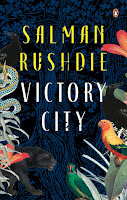A Moveable Feast
By Ernest Hemingway
It is a magical time and place - Paris in the twenties. Hemingway is a struggling young writer. There is little money and he has a wife and baby to support. But he is part of a set of writers and artists who are or will be household names. It’s literary voyeurism at its best.
A Moveable Feast was published after Hemingway’s death. A set of sketches of his time in Paris during his first marriage with Hadley, it shows us a Hemingway trying to become the Hemingway the world knows today, crafting his literary style, making and discarding friends, building up to the nastiness and the greatness he became known for later. The title is taken from something he said about Paris - “If you are lucky enough to have lived in Paris as a young man, then wherever you go for the rest of your life, it stays with you, for Paris is a moveable feast.”
In a lot of ways, Paris is the hero of the book. It’s a Paris that has probably all but disappeared a long time ago - a place where a struggling young artist could live cheaply and well, where there was Sylvia Beach and her book shop providing literary sustenance, where Ezra Pound created a fund to save TS Eliot from his bank job to allow him to write full time, where there are cafes to write in and parks to walk through, where there would always be a fellow-writer to go on trips with. It’s lovely and romantic, especially when you know your writing is going well, and you feel the world is there for the taking. Watching a beautiful young woman waiting for someone in a cafe he is writing in, Hemingway says “I’ve seen you, beauty, and you belong to me now, whoever you are waiting for and if I never see you again, I thought. You belong to me and all Paris belongs to me and I belong to this notebook and pencil.” It’s heady!
He writes about the famous figures he encounters. He doesn’t flatter, he is downright nasty sometimes. Fitzgerald is weak and a drunk, Zelda undermines his confidence, jealous of his writing and scornful of his manhood. His novel The Great Gatsby is pure genius and just for that Hemingway is willing to forgive him anything. Ford Maddox Ford has terrible breath and lies all the time and is disliked intensely by Hemingway. Ezra Pound is generous to a fault, even to writers not deserving of it. Gertrude Stein has regressive views on homosexuality, she plays favourites with the writers and artists invited to her home, and she has a falling out with Hemingway. James Joyce is a hero who frequents a restaurant Hemingway cannot afford, yet he attempts to go there hoping to catch a glimpse. All of this is terribly interesting and voyeuristic and is the literary equivalent of People magazine.
But what binds me to this book is Hemingway’s notes on his writing progress and his own consciousness of the purpose of his life - the writing, always the writing. “The blue-backed notebooks, the two pencils and the pencil sharpener (a pocket knife was too wasteful), the marble-topped tables, the smell of cafe cremes, the smell of early morning sweeping out and mopping and luck were all you needed.” It does not matter that he is poor and has sometimes to go hungry. It does not matter that the artists and famous people he meets always manage to disappoint him. He is writing and writing well. “Do not worry,” he tells himself, “ You have always written before and you will write now. All you have to do is write one true sentence. Write the truest sentence that you know.”
Hemingway is probably describing the happiest time of his life - married to Hadley whom he loves, probably the only woman he ever truly loved, living in beautiful Paris, moving among probable geniuses, and crafting his own literary legacy. It is a deeply evocative book. An older Hemingway manages to capture a more innocent time, a time when anything seemed possible, when everything seemed a bit more clear.
To be young and in Paris. It’s pure heaven. Especially when as an adult you know how it’s all going to end.




